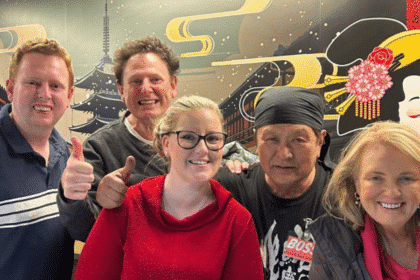Iris Chan is VMWare’s newly appointed marketing director for Australia and New Zealand. She sat down with B&T to chat about her career, and marketing top tips.
Chan has had an extensive career across APAC’s tech industry. In 2021, she was shortlisted for both B&T‘s Women Leading Tech and Women in Media awards – an impressive achievement which speaks to her level of knowledge and experience.
Prior to joining VMWare, Chan most recently led Seismic’s marketing sales development in Asia Pacific and Japan, and she has also held roles at FusionGrove, IBM, D2L and Cisco.
One of her passions is “the alignment between sales and marketing,” she explained to B&T.
“That’s a subject I’ve been speaking on, at industry forums, at conferences, podcasts and so on.”
That synthesis between sales and marketing has helped Chan cultivate a deep understanding of what tech companies should value. Indeed, she has four ideas that she had found to be the key to tech company marketing.
She began with the importance of honing in on the customer. “[You have to be] really customer focused, starting with a customer’s key points, their priorities, and their aspirational objectives,” Chan explained.
“This is an area where some tech companies may potentially be pushing a lot of product features and benefits, that tends to be a common trap. I think it’s really important to stay focused on the customer’s needs, and what really matters to them, and drive that relevance for the customer.”
The second idea follows neatly: that the customer should have both power and choice to engage with your brands through multiple channels.
Chan said, “essentially, it’s all about having that omnichannel approach. Content is the secret sauce here. Customers are actually now very self directed and digitally oriented in the current era. It’s about mapping the right content to different stages of the buying journey. It enables them to, you know, get the right information through the different channels where they’re actively trying to educate themselves.”
“Another area that I think is super important in terms of trying to be successful from a tech marketing perspective, is making sure that the customer has a consistently great experience throughout the buying journey,” she continued.
“Whether they’re interacting with marketing campaigns, marketing content, or they’re talking to a sales rep, or a customer service agent – whichever touch point we’re looking at, I think it’s really important to have that consistent experience. They’re really getting a lot of value, and the messaging is consistent as well.”
Finally, she explained that a number of tech companies were moving towards a subscription business model: “We are in a subscription economy these days. So customer’s success in the form of consumption, adoption, and actually making sure that the customer is realizing the value from their investments become critical to driving recurrent revenue.”
Embodying all of those ideas has helped both Chan, and the companies she has worked for. But, of course, the pandemic has created new challenges across all sectors.
For Chan, it has heightened the importance for resilience and adaptability within organisations.
“I think that has become really critical, given how volatile things can be – we’re experiencing that right now! So to succeed, organizations need to become digital right at the core and be flexible enough to meet rapidly changing customer and employee needs.”
That idea of becoming digital right to the core is a specific speciality of VMWare’s.
“We help organizations build a solid foundation to digitize their core business processes,” said Chan.
“We help the organizations build, run, manage, connect, and protect all types of applications everywhere. We do this by providing interoperable software and services that allow organizations to run any app, on any cloud, anywhere. Then, connecting all of these, whether it’s apps, clouds, data, endpoints, you name it, we bring all of these elements together underpinned by really robust networking technology and protecting these with embedded security.”
Successful transition is their goal: “We’re helping clients bridge from the old to the new as they go through this cloud journey. And we are neutral and an agnostic, so whether it’s public, private, or hybrid clouds, we can make it happen.”
Because of the breadth of her career – which spans Asia Pacific, Japan and Greater China – Chan was particularly illuminating on what the ANZ market can learn from wider trends in APAC.
What she sees is that “ANZ has been a much more mature market. We’ve adopted technologies a lot earlier.”
“[In contrast] our counterparts and some of the emerging markets we’re seeing in Asia, they are going through this process of actually leapfrogging over the successive generations of technology to the most recent version, and they have a huge focus on speed and convenience.”
Two areas that have had major traction in Asia are E-commerce and E-payments.
“You have people selling street food who actually provide QR codes for the buyers to scan in and do mobile epayments,” she said.
“This is happening in China, and I found that really fascinating. So I think driving that ubiquity is what we need to get to in ANZ. We’re actually coming on board and embracing a lot of that now. If you think of the Service New South Wales app – we’re using that for the digital driver’s license, and that became the accepted form of ID for police checks and for getting entry into licensed venues. Now, with COVID, the app has been further repurposed to do contact tracing and doing check ins at different venues, using the QR code. So I think we’re starting to embrace and make that a lot more prevalent in our everyday lives.”
Thinking about what different markets can learn from each other is also evidence that, while society is globalised, it is far from homogenous. This idea extends particularly to marketing global brands and ideas in line with the culture of individual regions.
Chan said, “we’re seeing a lot of global brands these days – your Starbucks, your Nikes, and so on. I think the role of regional and local advertising is to articulate the relevance of the brand to the local market, and really enable the brand to present the value messages in a way that aligns with the local events, culture and the local lifestyles.”
Assuming that a monocultural message will lead to business secuccess across all regions is a significant oversight, she explained.
“CMO Council did some research and they found that two thirds of marketers rate their efforts to translate and adapt across markets and channels as below satisfactory. What that’s telling me is that marketing leaders are struggling to meet the needs of local audiences and geographies with adaptive marketing creative.”
Ultimately, Chan’s experience has also left her with a clear guide for business success, broken down into three areas.
“The first one is really around alignment across business functions,” she said.
“It’s all about getting the go-to-market engine – your sales, marketing, customer service, and so on, to share common goals and have an integrated collaboration model, having shared accountabilities and aligned content and messaging, so they’re actually presenting a unified front to the customer. This goes back to my earlier point around having a consistently awesome experience for the customer. When all the functions are strongly aligned, you will actually see them performing much better.”
“Forrester actually did some research and they found that companies with strong cross functional alignment, see 19 per cent faster revenue growth and are 15 per cent more profitable. Jim Collins and Jerry Porras in their book ‘Built to Last‘ said, ‘building a visionary company requires 1 per cent vision, and 99 per cent alignment’. So for me, when I read that I thought that was really revealing. It showed that alignment was really something critical and foundational to the success of an organization.”
Her second success factor focuses on the importance of diverse talent.
“The benefits are clear when you have team members coming from different backgrounds, different skills, perspectives, and so on. They contribute to a broader range of ideas and options,” Chan explained.
“That makes it so much easier to innovate, to solve problems and to make informed decisions – and to make better decisions. So the company can come up with more winning offerings to propel growth. It’s really important having that diversity of talent. According to McKinsey’s 2020 study, companies in the top quartile of gender diversity and their executive teams have a 25 per cent likelihood of outperforming their industry peers on profitability.”
McKinsey’s study also showed that companies in the top quartile for ethnic and cultural diversity in executive teams were 36 per cent more likely to see industry-leading financial performance.
“It’s very clear that having diversity in the talent pool and in the leadership team makes a huge difference when it comes to profitability and business performance,” said Chan.
Her final point centered on the importance of agility and adaptability to both customers and the market, to ensure companies are maintaining their relevance.
She said, “this is about the ability to innovate fast enough in response to the market dynamics and the trends that are happening in the industry, and it’s about being able to constantly innovate, because if you don’t, the business is gonna stagnate.”
“Potentially, there’s a danger of losing market share and customer mindshare, because competitors would definitely catch up by driving, innovative ideas or offerings. So it’s really important for a business to constantly stay ahead of the game, constantly innovate and make sure they have the ability to transform. That adaptability, and that drive towards transformation is key to the success for a lot of organizations.”








